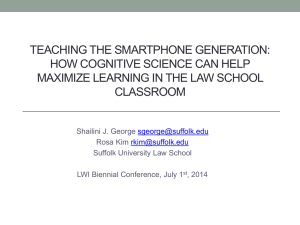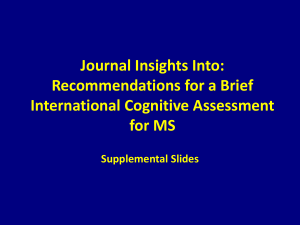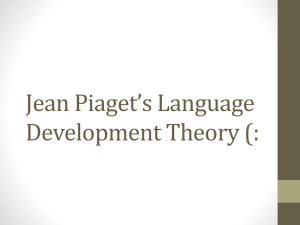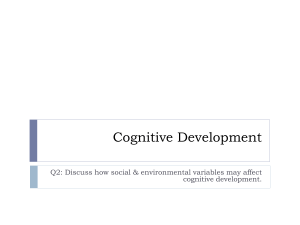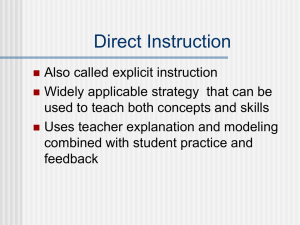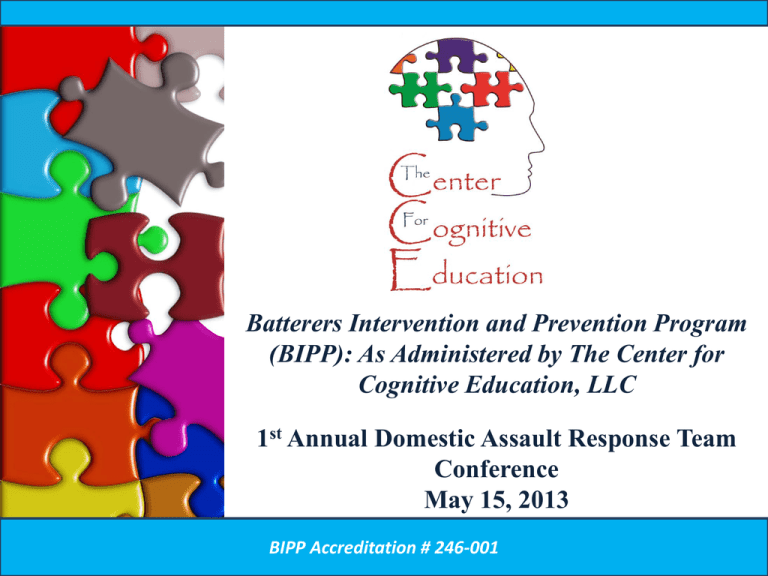
Batterers Intervention and Prevention Program
(BIPP): As Administered by The Center for
Cognitive Education, LLC
1st Annual Domestic Assault Response Team
Conference
May 15, 2013
BIPP Accreditation # 246-001
The Center for Cognitive Education
Topics of discussion
I. Typologies
II. Accreditation Standards
III. BIPP Program Structure and
Client Accountability
IV. Program Curriculum
V. References and Resources
VI. Contact information
The Center for Cognitive Education
I. Typologies: One Size
Does Not Fit All
• 24.4% of young married couples (18-28) engage in mild
physical aggression, including throwing things, pushing,
grabbing, or shoving a partner in the past year
(Pan1994;Whitaker 2007)
• Approximately 1.5 million women and 835,00 men are
physically assaulted or raped by intimate partners in the
U.S. annually (Whitaker 2007)
• 5.6% engage in more serious and damaging forms of
aggression, including choking, strangling, or beating their
partner, physically forcing sex, threatening with a weapon,
using a weapon (Pan 1994; Whitaker 2007)
• 70.1% did none of these things (Pan 1994; Whitaker
2007)
The Center for Cognitive Education
I. Typologies continued..
* Intimate Partner Terrorism
•
•
•
•
•
•
•
•
Aka: battering, spouse abuse, ‘wife beating’
10% of violent couples in community sample
74% in shelter samples
Primary abuser is almost always male
Violence is more frequent & severe/less likely to stop
Primary abuser coercively controls the partner
Female violence only in self-defense
Power and Control: “all he had to do was look at me
that way and I would do whatever he wanted”
• Coercive Control: non physical (as well as physical)
tactics used by abusers to maintain control over their
partners….Including intimidation, isolation, economic
control , controlling partner’s activities & decisions,
emotional abuse, erosion of independence and selfesteem.
The Center for Cognitive Education
I. Typologies continued..
* Situational Couple Violence
•
•
•
•
Violence initiated equally by women and men
Violence is less frequent and not as severe
Not characterized by a pattern of coercive control
One of many tactics used by partners to express
conflict and disagreement
• An “expressive, misguided, and cathartic response”
• The two types of violence are not defined by the
nature or frequency of violent acts but solely in terms
of the relationship “level of control context” in which
they are embedded. Intimate Partner Terrorism is
violence that is embedding in a general pattern of
control; Situational Couple Violence is not.
The Center for Cognitive Education
I. Typologies continued..
It is not always what it looks like, meaning:
• Some Intimate Partner Terrorists (IPT) may
gain control without resorting to a high level of
violence.
• Similarly, Situational Couple Violence (SCV),
although more likely than ‘intimate terrorism’ to
involve only isolated low-level violence, can be
in some cases be frequent or deadly.
The Center for Cognitive Education
I. Typologies continued..
Treatment and Case Management
Implications:
• SCV are more likely to be more responsive to
supportive help programs such as BIPP and traditional
services for divorcing partners (parenting classes; anger
management; mediation; or couples/family/individual
counseling). “Stake in Conformity”
• In contrast, it may not be safe or realistic to expect
divorcing IPT partners to learn how to “cooperate” and
“improve their relationship”. Instead, they may require
more safety-focused plans and custody agreements. A
“containment” model is recommended. Focus on
concrete education, skill-building of how to live a nonviolent lifestyle.
The Center for Cognitive Education
II. Accreditation
Standards
(For a detailed description of BIPP guidelines:
http://www.tcfv.org)
* The CCE, BIPP Accreditation #246-001.
* Basic, Non-Negotiable Guidelines:
• Minimum of 18 weeks/36 hours; one session per week;
no more than 15 participants in one group.
• Curriculum standards support: holding participants
accountable; the goal of “no more violence”; cognitive
based. Cannot include: techniques that present anger or
psychopathology (of either partner) as the cause of
family violence; marriage or couples counseling.
• Minimum training and continued training /supervision
for Facilitators.
• Notification to victims (start / termination / completion)
• Requirements related to confidentiality.
The Center for Cognitive Education
II. Accreditation
Standards cont..
* Basic, Non-Negotiable Guidelines cont.. :
• Support collaboration with other agencies. Guidelines on
monthly reports and other documentation to referral
sources.
• Requires monthly statistics be sent to governing agency.
• Requires programs to be active in community education.
• Only designed to address males who engage in intimate
partner violence.
* Benefits of Accreditation:
• Establishes and maintains quality control of those
providing services to men who engage in intimate partner
violence.
The Center for Cognitive Education
III. BIPP Program Structure
& Client Accountability
The primary goal of the BIPP is to help clients learn
responsible, non-violent thinking and behavioral skills so
that they do not physically or emotionally harm other
persons.
Significant Objectives of the Program Agreement:
• I will stop all of my violent, abusive, threatening, and
controlling behaviors, including stalking and violation of a
protective order.
• I will use only non-abusive, non-controlling, and nonintimidating behavior toward other group participants and group
facilitators.
• I will be able to identify and describe personally relevant
thinking errors and give personal examples.
• I will be able to verbalize an understanding of the relationship
between my thinking errors and my offense, and other offense
behavior, if applicable.
The Center for Cognitive Education
III. BIPP Program Structure &
Client Accountability cont..
Significant Objectives of the Program Agreement:
• I will be able to describe and/or demonstrate in role-play
exercises how to overcome each personally relevant thinking
error.
• I will be able to describe and/or demonstrate in role-play
exercises appropriate coping strategies to effectively deal with
high risk trigger situations.
• I will have no illegal drug use and will stay alcohol free while
participating in intervention services.
• I will fulfill my financial agreements made to the program.
Client Accountability and Program Rules
• I agree to attend the BIPP program on a weekly basis for a
minimum of 24 sessions (1 ½ hour sessions). If you have more
than three unexcused absences, you will be suspended from the
program and referred back to the referring agency for review to
restart the program. If you are required to restart the program,
you will not receive credit for previously attended sessions.
The Center for Cognitive Education
III. BIPP Program Structure &
Client Accountability cont..
• I agree to dress appropriately for group. No sleeveless shirts;
caps; inappropriate slogans or saying on clothing, etc..
• I agree to arrive on time for each session. If I am more than 15
minutes late I will be charged for the session but I will not be
allowed to receive credit for the session. Each session will last
90 minutes. This will be acknowledged as an unexcused session
and your number of required sessions will be extended for each
time you are late more than 15 minutes. You may be considered
for a suspension and required to restart the program if tardiness
continues to be an issue.
• I agree to pay the $25.00 fee for each session at the time the
session is held. I understand that if I become more than $75.00
delinquent on fees, I may be discharged from the program and
referred back to the referring agency for review to restart.
• I agree to pay $25.00 for any unexcused session.
• I agree to purchase the Resources and Homework Workbook for
a cost of $20.00.
• I agree not to use alcohol or illicit drugs while enrolled in the
program and will stay alcohol free.
The Center for Cognitive Education
III. BIPP Program Structure &
Client Accountability cont..
• I agree not to threaten any other group members or
staff members at any time. If I do so, I will be asked to leave the
group immediately. I am also aware that my community
supervision officer, the Court, or other referral source will be
notified of my threatening behavior. I understand that if the
above occurs that I may be terminated from the treatment
program.
• I agree not to bring weapons to the group.
• I agree to fully participate in the sessions and to complete the
required homework assignments before group. If you do not
complete the homework assignments, you will not receive
credit for the session.
• I agree to complete a written and verbal Weekly Check-in
assignment and I will give an accurate and honest evaluation of
my weekly progress.
• I am aware that the BIPP staff member will evaluate my
progress on a regular basis and will be communicating with my
community supervision officer, the Court, or other referral
source the progress I have made.
The Center for Cognitive Education
III.BIPP Program Structure &
Client Accountability cont..
• I agree to respect the confidentiality of other group members
by not divulging their identities or information about them to
anyone else.
• I agree not to bring food or beverages (other than clear bottle
water) in the building and/or group meeting room.
• I agree to refrain from victim blaming and will refer to all
persons, present or not, in respectful terms.
PROGRAM STRUCTURE IS THE PLATFORM FOR
LEARNING AND CHANGE
The Center for Cognitive Education
IV. Program Curriculum
* The STOP Program.
“Innovative Skills, Techniques, Options, and
Plans for Better Relationships”.
By David Wexler, Ph.D. (2000 and 2006)
* Corrective Thinking Model
By Truthought, LLC.
www.truthought.com
Review Program Out-line
(within handouts)
The Center for Cognitive Education
V. References and
Resources:
A Manual for Delivery of Cognitive Self Change ; Vermont
Department of Corrections, 2002 (www.nicic.org/Library/021558)
Charting a New Course and Corrective Thinking Process
Training aid and certification offered by Truthought, LLC
(www.truthought.com)
TM
TM
Thinking for a Change: National Institute of Corrections
(www.nicic.org/Library/017124)
Vermont’s Cognitive Self Change Program: A 15 year Review;
(www.thefreelibrary.com/Vermont’s+Cognitive+Self+Change+
Program:+A+15+Year+Review-a079665471)
Motivating Offenders to Change: National Institute of Corrections
(www.nicic.gov/Library/022253)
STOP Domestic Violence ; by David B. Wexler, Ph.D. (2000/2006)
The Center for Cognitive Education
VII. Contact Information:
The Center for Cognitive Education, LLC.
503 Main Street, Georgetown, TX 78626
Web-site: www.theccedu.org
Tel. 512-868-9644 Fax. 512-868-2644
Dean Eddy, MA, LPC-S, LSOTP-S
Managing Partner; BIPP Administrator
Email: deddy@theccedu.org
Cell: 512-966-8830
Angela De La Rosa, BS
Managing Partner; CEP/NIPV Administrator
Email: adelarosa@theccedu.org
Cell: 512-585-8095




